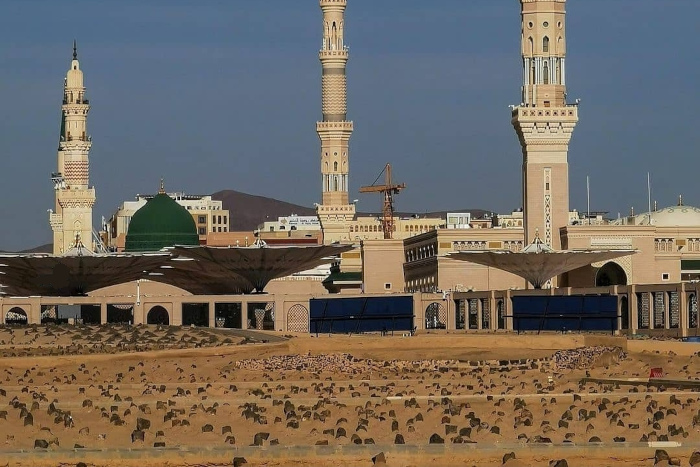
After the third takbeer in janaazah salaah, one should recite the following duaas:
Duaa One:
أللّٰهُمَّ اغْفِرْ لِحَيِّنَا وَمَيِّتِنَا وَشَاهِدِنَا وَغَائِبِنَا وَصَغِيْرِنَا وَكَبِيْرِنَا وَذَكَرِنَا وَاُنْثَانَا اَللّٰهُمَّ مَنْ اَحْيَيْتَهُ مِنَّا فَاَحْيِهِ عَلَى الْاِسْلاَمِ وَمَنْ تَوَفَّيْتَهُ مِنَّا فَتَوَفَّهُ عَلَى الْاِيْمَانِ
O Allah! Forgive those of us who are living and those who are dead, those that are present and those that are absent, the young among us and the old among us, the men among us and our women. O Allah! Whoever among us You keep alive, then keep him alive on Islam, and whoever among us You grant death, then bless him with death on Imaan.
عن أبي هريرة، قال: كان رسول الله صلى الله عليه وسلم إذا صلى على الجنازة، قال: اللهم اغفر لحينا وميتنا، وشاهدنا وغائبنا، وصغيرنا وكبيرنا، وذكرنا وأنثانا، اللهم من أحييته منا فأحيه على الإسلام، ومن توفيته منا فتوفه على الإيمان (سنن الترمذي، الرقم: 1024، مسند أحمد، الرقم: 8809)
Hazrat Abu Hurairah (radhiyallahu ‘anhu) reports that Rasulullah (sallallahu ‘alaihi wasallam) would recite the following dua in the janaazah salaah:
أللّٰهُمَّ اغْفِرْ لِحَيِّنَا وَمَيِّتِنَا وَشَاهِدِنَا وَغَائِبِنَا وَصَغِيْرِنَا وَكَبِيْرِنَا وَذَكَرِنَا وَاُنْثَانَا اَللّٰهُمَّ مَنْ اَحْيَيْتَهُ مِنَّا فَاَحْيِهِ عَلَى الْاِسْلاَمِ وَمَنْ تَوَفَّيْتَهُ مِنَّا فَتَوَفَّهُ عَلَى الْاِيْمَانِ
Duaa Two:
اللَّهُمَّ اغْفِرْ لَهُ وَارْحَمْهُ وَعَافِهِ وَاعْفُ عَنْهُ وَأَكْرِمْ نُزُلَهُ وَوَسِّعْ مَدْخَلَهُ وَاغْسِلْهُ بِالْمَاءِ وَالثَّلْجِ وَالْبَرَدِ وَنَقِّهِ مِنَ الْخَطَايَا كَمَا يُنَقَّى الثَّوْبُ الْأَبْيَضُ مِنَ الدَّنَسِ وَأَبْدِلْهُ دَارًا خَيْرًا مِنْ دَارِهِ وَأَهْلًا خَيْرًا مِنْ أَهْلِهِ وَزَوْجًا خَيْرًا مِنْ زَوْجِهِ وَأَدْخِلْهُ الْجَنَّةَ وَأَعِذْهُ مِنْ عَذَابِ الْقَبْرِ وَعَذَابِ النَّارِ
O Allah, forgive him, have mercy on him, grant him aafiyah (peace) and pardon him. Grant him an honoured stay and make his grave spacious. Wash him with water, snow and hail. Cleanse him from his sins as a white garment is cleansed from dirt. Grant him an abode better than his (earthly abode), with a household better than his household and a wife better than his wife. Admit him into Paradise and protect him from the punishment of the grave and the punishment of Jahannum.
عن جبير بن نفير، سمعه يقول: سمعت عوف بن مالك، يقول: صلى رسول الله صلى الله عليه وسلم على جنازة، فحفظت من دعائه وهو يقول: اللهم اغفر له وارحمه وعافه واعف عنه، وأكرم نزله، ووسع مدخله، واغسله بالماء والثلج والبرد، ونقه من الخطايا كما نقيت الثوب الأبيض من الدنس، وأبدله دارا خيرا من داره، وأهلا خيرا من أهله وزوجا خيرا من زوجه، وأدخله الجنة وأعذه من عذاب القبر أو من عذاب النار قال: حتى تمنيت أن أكون أنا ذلك الميت (صحيح مسلم، الرقم: 963)
Hazrat Auf bin Maalik (radhiyallahu ‘anhu) reports that on one occasion, Rasulullah (sallallahu ‘alaihi wasallam) performed the janaazah salaah. I had memorized the abovementioned dua from him (which he recited in the janaazah salaah).
He further says (after hearing this dua of Rasulullah (sallallahu ‘alaihi wasallam)), “I wished that I had been the deceased (for whom Rasulullah (sallallahu ‘alaihi wasallam made this dua).”
Duaa Three:
اللّهُمَّ أَنْتَ رَبُّهَا وَأَنْتَ خَلَقْتَهَا، وَأَنْتَ هَدَيتَهَا إِلَى الإسْلَامِ، وَأَنْتَ قَبَضْتَ رُوحَهَا، وَأَنْتَ أَعْلَمُ بِسِرِّهَا وَعَلَانِيَتِهَا، جِئْنَا شُفَعَاءَ فَاغْفِرْ لَهُ
O Allah, You are the Rabb of this janaazah (i.e. this deceased person), You have created him, You guided him to Islam, and You took away his soul. You are most knowledgeable regarding his secret life and his apparent life. We have come seeking intercession (on his behalf). Therefore, forgive him.
وعن أبي هريرة عن النبي صلى الله عليه وسلم في الصلاة على الجنازة: اللهم أنت ربها وأنت خلقتها، وأنت هديتها إلى الإسلام، وأنت قبضت روحها، وأنت أعلم بسرها وعلانيتها، جئنا شفعاء فاغفر له (سنن أبي داود، الرقم: ٣٢٠٠، مشكاة المصابيح، الرقم: 1688)
Hazrat Abu Hurairah (radhiyallahu ‘anhu) reports that Rasulullah (sallallahu ‘alaihi wasallam) would recite the abovementioned dua in the janaazah salaah.
Duaa Four:
اللَّهُمَّ عَبْدُكَ وَابْنُ أَمَتِكَ احْتَاجَ إِلَى رَحْمَتِكَ وَأَنْتَ غَنِيٌّ عَنْ عَذَابِهِ إِنْ كَانَ مُحْسِنًا فَزِدْ فِي إِحْسَانِهِ وَإِنْ كَانَ مُسِيئًا فَتَجَاوَزَ عَنْهُ
O Allah, (This is) Your slave and the son of Your slave girl who is in need of Your mercy, and You are not in need of punishing him. If he was a good person (during his life), then increase his goodness (by increasing the reward of his good deeds), and if he was a sinful person (during his life), then overlook his sins and forgive him.
عن يزيد بن عبد الله بن ركانة بن المطلب ، قال: كان رسول الله صلى الله عليه وسلم إذا قام للجنازة ليصلي عليها قال: اللهم عبدك وابن أمتك احتاج إلى رحمتك وأنت غني عن عذابه إن كان محسنا فزد في إحسانه وإن كان مسيئا فتجاوز عنه. هذا إسناد صحيح ويزيد بن ركانة وأبوه ركانة بن عبد يزيد صحابيان من بني المطلب بن عبد مناف ولم يخرجاه (المستدرك على الصحيحين للحاكم، الرقم: 1329)
Hazrat Yazeed bin Abdullah (radhiyallahu ‘anhu) reports that Rasulullah (sallallahu ‘alaihi wasallam) would recite the abovementioned dua when performing the janaazah salaah.
Duaa Five:
اللَّهُمَّ عَبْدُكَ وَابْنُ عَبْدِكَ وَابْنُ أَمَتِكَ كَانَ يَشْهَدُ أَنْ لاَ إِلَهَ إِلاَّ أَنْتَ وَأَنَّ مُحَمَّداً عَبْدُكَ وَرَسُولُكَ وَأَنْتَ أَعْلَمُ بِهِ اللَّهُمَّ إِنْ كَانَ مُحْسِناً فَزِدْ فِي إِحْسَانِهِ وَإِنْ كَانَ مُسِيئاً، فَتَجَاوَزْ عَنْ سَيِّئَاتِهِ اللَّهُمَّ لاَ تَحْرِمْنَا أَجْرَهُ وَلاَ تَفْتِنَّا بَعْدَهُ
O Allah, (This is) Your slave, the son of Your slave and the son of Your slave girl. He testified that there is none worthy of worship except You and that Muhammad (sallallahu ‘alaihi wasallam) is Your slave and Your messenger, and You are most knowledgeable regarding him. O Allah, if he was a good person (during his life), then increase his goodness (by increasing the reward of his good deeds), and if he was a sinful person (during his life), then overlook his sins and forgive him. O Allah, do not deprive us of his reward (i.e. do not deprive us the reward which we will receive through exercising patience upon his demise by us saying anything against the dictates of shariah or not exercising patience), and do not put us into trials after him (i.e. after his demise, keep us firm on shariah and save us from falling into trials and tribulations).
عن سعيد بن أبي سعيد المقبري، عن أبيه؛ أنه سأل أبا هريرة، كيف يصلى على الجنازة فقال أبو هريرة: أنا لعمر الله أخبرك. أتبعها من أهلها. فإذا وضعت كبرت. وحمدت الله. وصليت على نبيه. ثم أقول: اللهم عبدك، وابن عبدك، وابن أمتك. كان يشهد أن لا إله إلا أنت. وأن محمدا عبدك ورسولك. وأنت أعلم به. اللهم إن كان محسنا، فزد في إحسانه. وإن كان مسيئا، فتجاوز عن سيئاته. اللهم لا تحرمنا أجره ولا تفتنا بعده. (الموطأ للإمام مالك، الرقم: 775)
It is reported that Hazrat Abu Sa’eed Maqburi (rahimahullah) once asked Hazrat Abu Hurairah (radhiyallahu ‘anhu), “How should one perform the janaazah salaah?” Hazrat Abu Hurairah (radhiyallahu ‘anhu) replied, “By the qasm of Allah who is Eternal, I will most definitely inform you. I follow the janaazah of the deceased from the home (of the deceased), then when the janaazah is placed down (for the salaah to be performed), I say the takbeer (to commence the salaah). I then praise Allah Ta’ala (after the first takbeer), recite durood upon Rasulullah (sallallahu ‘alaihi wasallam) (after the second takbeer), and I then recite the following dua (after the third takbeer):
اللَّهُمَّ عَبْدُكَ وَابْنُ عَبْدِكَ وَابْنُ أَمَتِكَ كَانَ يَشْهَدُ أَنْ لاَ إِلَهَ إِلاَّ أَنْتَ وَأَنَّ مُحَمَّداً عَبْدُكَ وَرَسُولُكَ وَأَنْتَ أَعْلَمُ بِهِ اللَّهُمَّ إِنْ كَانَ مُحْسِناً فَزِدْ فِي إِحْسَانِهِ وَإِنْ كَانَ مُسِيئاً، فَتَجَاوَزْ عَنْ سَيِّئَاتِهِ اللَّهُمَّ لاَ تَحْرِمْنَا أَجْرَهُ وَلاَ تَفْتِنَّا بَعْدَهُ
Duaa Six:
اللَّهُمَّ إنَّ فُلانَ بْنَ فُلَانٍ في ذِمَّتِكَ وَحَبْلِ جِوَارِكَ فَقِهِ مِن فِتْنَةِ القَبْرِ وَعَذَابِ النَّار وَأَنتَ أَهلُ الوفاءِ وَالحَمْدِ اللَّهُمَّ فاغفرْ لَهُ وَارْحَمْهُ إنَّكَ أنتَ الغَفُورُ الرَّحِيم
O Allah, indeed so and so person is in Your protection and care, so save him from the trials of the grave and the punishment of the fire, You are most worthy of fulfilling promises and You are most worthy of praise. O Allah, forgive him and have mercy on him, certainly You are the Most forgiving, Most merciful.
عن واثلة بن الأسقع قال: صلى بنا رسول الله صلى الله عليه وسلم على رجل من المسلمين فسمعته يقول: اللهم إن فلان بن فلان في ذمتك فقه فتنة القبر. قال عبد الرحمن: في ذمتك وحبل جوارك فقه من فتنة القبر وعذاب النار وأنت أهل الوفاء والحمد اللهم فاغفر له وارحمه إنك أنت الغفور الرحيم. (سنن أبي داود، الرقم: 3202)
Hazrat Waathilah bin Asqa’ (radhiyallahu ‘anhu) reports: “On one occasion, Rasulullah (sallallahu ‘alaihi wasallam) led us in janaazah salaah. I heard him recite the abovementioned dua.
 Ihyaaud Deen An Effort to Revive Deen in Totality
Ihyaaud Deen An Effort to Revive Deen in Totality



